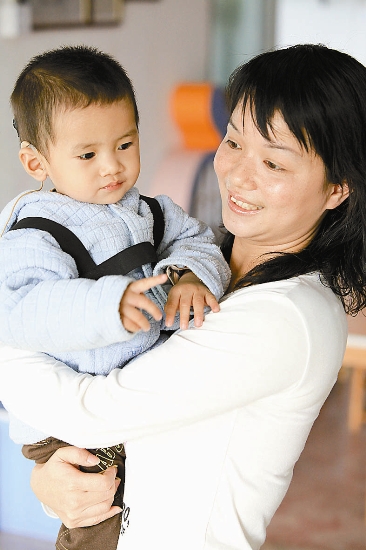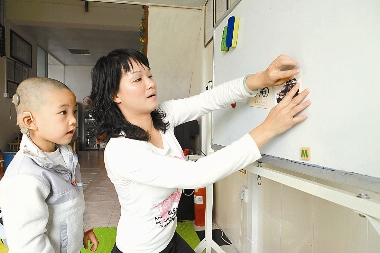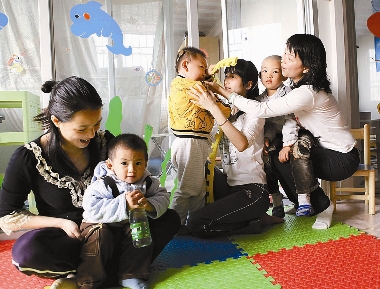
Wu Xueling and Zhuang Shunan, 5, who is receiving training at Wu’s center to learn how to speak .

Wu Xueling teaches Zhuang Shunan to say the names of vehicles.

Wu Xueling (R) and another teacher Wu Xuejing (2nd L) teach Wang Zihao, 2, and Zhuang Shunan, 5, to speak. Photos by Sun Yuchen
Jane Lai
NOTHING is deeper than a mother’s love. She shelters and guides us wherever we are. She understands and forgives us for our mistakes. She loves and treasures us no matter what may come.
Wu Xueling is one such mother. The 33-year-old brought her deaf daughter out of a silent world and enabled her to live like any other child.
But what makes Wu special is that her love is not limited to her own child. She has so far helped 32 deaf children to speak at her non-profit Qingqing Speech Recovery Service Center in Luohu District — the first of its kind in Shenzhen.
Entering the tidy, child-friendly center, visitors are treated to a song — presented by the kids — from domestic cartoon “Pleasant Goat and Big Big Wolf.” Few visitors can imagine these same kids used to live a life without sound.
Desperate but persistent
Teaching children with hearing disabilities to speak is not an insurmountable challenge, but to help them regain confidence and the desire to cope with the “sound world” requires special training.
Wu, a native of neighboring Huizhou, moved to Shenzhen in 1997 and had a daughter in 1999. But she discovered that, at 1 year old, Jinqing did not respond to sound. Tests revealed the baby girl was deaf.
On being told the news at the hospital, Wu fainted.
“It was like a bolt from the blue. My husband and I felt so desperate. Every night, the knowledge she could not hear my lullabies was killing me. I was so jealous hearing other kids calling ‘mommy,’” Wu recalls.
The couple made every effort to cure Jinqing, with Wu even begging a doctor to transplant one of her eardrums to her daughter — but she was told it would not work.
Thanks to the help of Hong Kong Adventist Hospital, Shenzhen Disabled Person’s Federation and Yantian International Container Terminals (YICT), where Wu’s husband worked, Jinqing was brought out of her silent world. In 2001 she underwent a 200,000-yuan (US$29,290) cochlear implant operation at the Adventist Hospital, with the family paying only a fraction of the costs.
Then, Wu recalls, the real challenge came. The hard of hearing face the sort of pressure and discrimination that “normal” children will never experience. And they must still face the fearful silence when they remove their cochlear implants for showering and sleeping.
What’s more, Wu says, children with hearing disabilities do not, at first, know how to make sounds. They can become frustrated, even angry, when they discover they cannot make themselves understood.
After her daughter’s operation, Wu started to take speech recovery training courses in Hong Kong, Guangzhou and Shenzhen.
“Under experts’ guidance, I paid attention to every detail that could stimulate a deaf kid’s interest in communicating with others, learning about the world and taking care of herself,” Wu says.
While the training was difficult and sometimes tedious, Jinqing gradually became outgoing and cheerful. Most importantly, she started to speak like other children. Wu’s persistence had paid off.
Now the 11-year-old Jinqing is a Grade Five primary school student in Yantian District, performing better than average, with a particular fondness for dancing and drawing.
Spreading the love
Since 2003, numerous parents have come to Wu for advice regarding their children’s hearing problems. Some of the children have had cochlear implant surgery and others, who are not completely deaf, use a hearing aid.
By the end of 2009, Wu had taught 32 such children to speak.
Among the students is 7-year-old Zheng Yang who became able to speak last year. The boy lost his hearing following an adverse reaction to fever medication he was given at the age of 1, according to his father, Zheng Chaowu.
Zheng said after he heard about Wu’s success, he rushed his son to the center in 2008.
Zheng clearly remembers the most exciting moment of all: when his son called him daddy for the first time. “I burst into tears. No one will ever know how grateful I was,” the father says. His son is now a primary student in Bao’an District.
Nine-year-old Zhong Bin is another example: few can imagine this talkative boy used to live in total silence. Every day, he chats away while playing computer games with his mother, Huang Huiling. Huang attributes her sons recovery entirely to Wu’s training.
Listening for the future
Although tired, Wu prides herself on having helped 32 deaf children recover. This pride inspired her to establish the speech recovery service center.
However, setting up a private non-profit organization was a much tougher task than Wu and her family had expected.
Wu spent a lot of time finding teachers who had specialist training. Moved by Wu’s passion, they accepted a monthly salary of less than 1,000 yuan. Wu’s two younger sisters, who also hold certificates in speech therapy training, joined her.
Further difficulties were encountered when it came to choosing the right venue, attaining a hygiene permit and getting money for interior decoration and facilities. The family had spent all it had, plus a loan to buy the 100-square-meter-plus apartment that serves as the center venue.
Fortunately, Wu’s story had inspired a lot of people. The YICT’s former general manager, Xie Jintian, donated facilities worth more than 10,000 yuan. Zheng and one caring resident, Liang Zilian, donated interior decoration materials. Another resident, Geng Jiongwei, provided a team of workers for two months to decorate the venue, free of charge.
Jinqing also offered Wu her government subsidy of 10,000 yuan and insisted on moving the family’s only computer to the center, saying: “I hope more kids can hear the voice of the world.”
Public appeal
According to Wu, children under the age of 7 recover from hearing problems quickest, but those under 10 who have taken similar courses before can also apply to the Qingqing Speech Recovery Service Center.
By the end of January, 10 students had applied to join the center.
At present, the center is unable to take applicants with mental disabilities, as the center staff has not yet undertaken training for such children, Wu says.
A single course at Wu’s center lasts at least a year. Each class of four to five students stays at the center between 8 a.m. and 5 p.m. Monday through Friday at a cost of around 1,400 yuan, which covers food and daily necessities.
“But,” Wu adds, “there are still a large number of families that cannot afford the cost and we encourage donations from the public to help them recover.”
“My hope is that one day there are no deaf people and all will be able to receive speech therapy,” Wu says. “After that, they will be able to support themselves and will not need to rely on society.”


